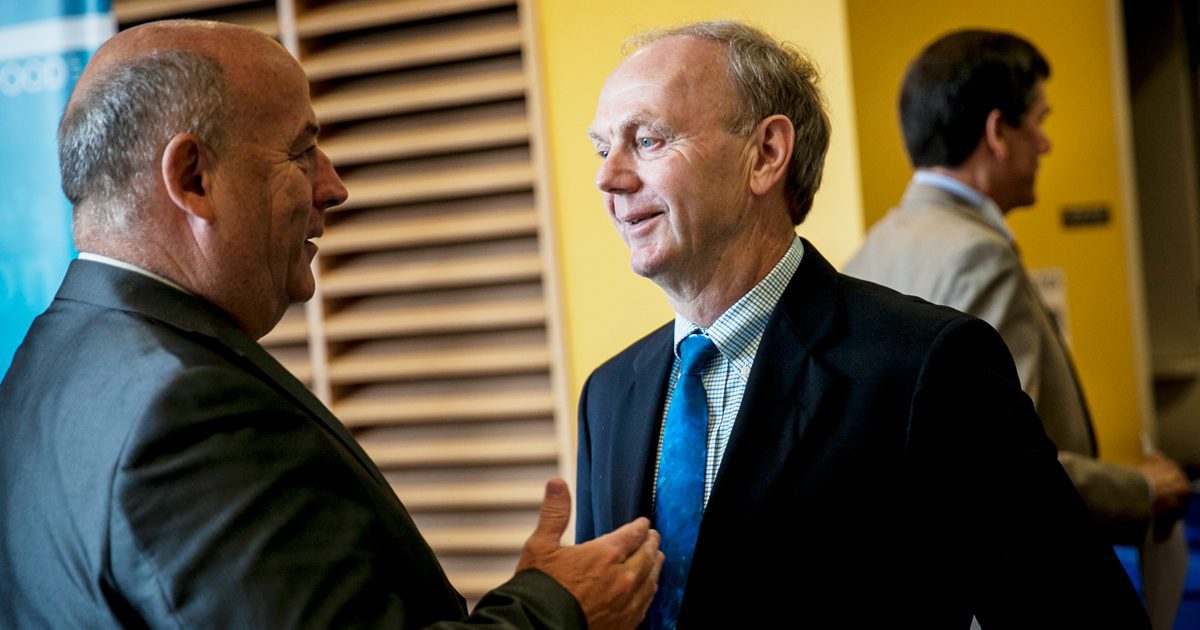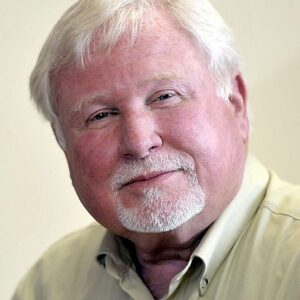Alan Caron, the candidate with a reputation for being an idea generator, has ended his campaign to become Maine’s next governor. Caron, who had been one of two Independents in the race, announced his exit Monday morning at the Portland Public Library.
“I will endorse Janet Mills,” Caron told Pine Tree Watch on Sunday, on the condition that this story not be posted until he made his public announcement. “She is the best suited among the remaining three candidates to move Maine in a new direction. Janet has a toughness to get things done. She has a tenderness for Maine people.”
Caron said he decided about three weeks ago to leave the race. Although he was buoyed by the reactions from people listening to his ideas at gubernatorial forums, he understood the reality of his standing relative to Mills, the Democratic candidate, Republican Shawn Moody and independent Terry Hayes.
Various polls have shown Caron in fourth place with a single-digit percentage of votes. “I’m writing the end of this chapter of my life. There will be another chapter.”
Caron, 67, who worked on the campaigns of former U.S. Congressman Tom Andrews and former Maine Gov. Joseph Brennan, said in mid-August he didn’t want to play the spoiler in the 2018 gubernatorial election. “I don’t have an ego.”
“Anyone who cannot win the election needs to get out of the race by mid-October,” Caron said in late August. “I have a hell of an uphill battle.”
But Caron passed his that deadline, stayed in the race, and was criticized by those pointing to his prior assertion that he would not want to siphon votes from either Janet Mills or Shawn Moody by lingering in the race too long. Eliot Cutler, another independent candidate, was criticized by liberal voters for cutting into votes for Democrats Libby Mitchell in 2010 and Mike Michaud in 2014.
During a conversation with Pine Tree Watch on Sunday, Caron said his plan this month was to remain in the race as interest in the election continued to build. He heard the calls to drop out. But as he traveled the state in his mobile campaign office, a 12-year-old, 32-foot RV rechristened “The New Maine Express, he also heard something else. “People were telling me to keep going, keep going because they liked what I was saying.
“It was a strategic decision (to stay in the race),” Caron said on Sunday. “The bigger the audience, the more attention I’d get when I endorse Janet.”
RELATED: FIVE FIRST-TIME WOMEN CANDIDATES VIE FOR SEATS IN THE MAINE LEGISLATURE
Caron said he wasn’t persuaded that Moody’s career as a businessman would enable him to govern Maine with the same success. Caron agreed with Hayes’ campaign focus of “people over partisanship” but wondered what actual plans she had for Maine’s future.
“They’re all good people,” Caron said. During a forum at the University of New England several weeks ago, he said he would find places for all three of them in his administration, if elected.
“I’m an incurable optimist. I tend to focus on the positive,” Caron said. “I have tried, in this race, to elevate the conversation to an exchange of ideas that move Maine forward.”
Just last week, Caron visited Portland, Augusta and Bangor for quick news conferences to present “A Plan for Sustainable Prosperity.” He listed eight points, from growing “Tomorrow’s Economy” to “Make Maine a Welcoming State.”
He called them his eight big ideas, contrasting them to his opponents’ little ideas. He was particularly passionate that day in Augusta about “fixing our elections” and establishing an open primary in June for all candidates and voters. Using ranked-choice voting in the primary, the top two candidates would campaign for election in November.
The ideas were typical of how Caron’s mind works, thinking of new solutions to old problems.
He began life as a low-income kid in the Franco community in Waterville’s South End. He was a ninth-grade high school dropout after suffering a head injury from a fall off a so-called Tarzan rope.
Because of the injury, Caron says he was later told by doctors that he probably would never be gainfully employed and shouldn’t start a family. More than 50 years later, after earning a master’s degree in Public Administration from the John F. Kennedy School of Government at Harvard University – without ever attending college as an undergraduate – starting economic think tanks, writing books and advising politicians and corporations and neighborhood associations, he was running to become Maine’s next governor. Caron, who is married, started that family, and has three children of his own.
“Give Alan a message for me,” Augusta-based attorney and early admirer of Caron’s John Larouche said three days before Caron’s announcement. “Tell him he can’t drop out of the race. Maine needs his ideas.
“Alan needs a role in Maine government,” said Larouche, a self-described conservative Republican and social liberal.
Larouche, 71, and Caron first met when both were asked to serve on a prison-reform task force formed by then-Gov. Kenneth Curtis. Larouche, asked to lead the task force, was a young attorney and graduate of Harvard and George Washington University Law School.
Caron had been released a year or two earlier from the Maine Correctional Center in Windham after serving eight months for violating probation. He initially had been charged at 15 with possession of stolen goods after he and some friends stole vestments and other items from Catholic priests. The larceny was a sort of payback for the misery Caron’s mother suffered from being ex-communicated by the Catholic Church for having a child out of wedlock. That child was Caron.
“You have to understand that if you lived in a Franco-American community at that time (1950-60s), the church was the center of our lives. I could hear my mother crying behind her bedroom door on Sundays because she couldn’t go to Mass,” Caron said. “I guess, in my own way, I was trying to defrock the priests.”
Caron, who previously had helped organize and lead the Statewide Correctional Alliance for Reform (SCAR) to address prisoners’ rights, and Larouche worked on the task force together for about 18 months.
“It was a non-partisan group,” Larouche said of the governor’s task force. “Republicans, Democrats. Gov. Curtis didn’t care. He wanted ideas. Alan had ideas. He was smart then and he is smart now.”
“I thought Ken Curtis was a transformative governor,” Caron said back in August. “He brought people together to find solutions. We have to do that again.”
Larouche was struck not only by Caron’s intelligence but also by his perception of the world around him. They are not good friends, but their paths crossed over the years.
RELATED: A LOOK AT ALL 186 LEGISLATIVE SEATS UP FOR GRABS ON NOV. 6
Larouche cites an example of Caron’s early advocacy for renewable energy and presenting his ideas to Central Maine Power Co. CMP had retained Larouche around the same time.
He said Caron’s ideas were ahead of their time, that the technology didn’t exist to create batteries that could efficiently store energy from wind and solar sources. “Now there is that technology to make it work. Alan saw that.”
Last Monday, while he was still campaigning and presenting ideas, Caron called for energy independence, saying that more than $5 billion was leaving the state to pay for fossil fuels energy. Renewable or alternative energy was and still is a solution Caron believes can help Maine.
“Maybe 25 percent of Alan’s ideas are not workable,” said Larouche. “But it’s that 75 percent that need to be investigated.”
Caron laughed when he heard Larouche’s percentage breakdown.
“I think it’s more than 25 percent. It’s the dilemma of an inventor that a lot of ideas need more work. It took (Thomas Edison) 10,000 times to get the filament right in the light bulb.”
Actually, history says Edison failed more than 1,000 times before he was successful but Caron made his point. Ideas evolve. Ideas need to be formed.
“Alan likes to work from the inside,” Larouche said. “He’s not a show horse.”
Sunday, Caron did not comment on any opportunity to work inside with the next administration. At any rate, his mind will continue to think of ideas that become solutions.
“Of course I’m disappointed that I won’t be governor of this great state,” he said. “But I was able to reach a new audience. It was good for me. It was good for the state.”







